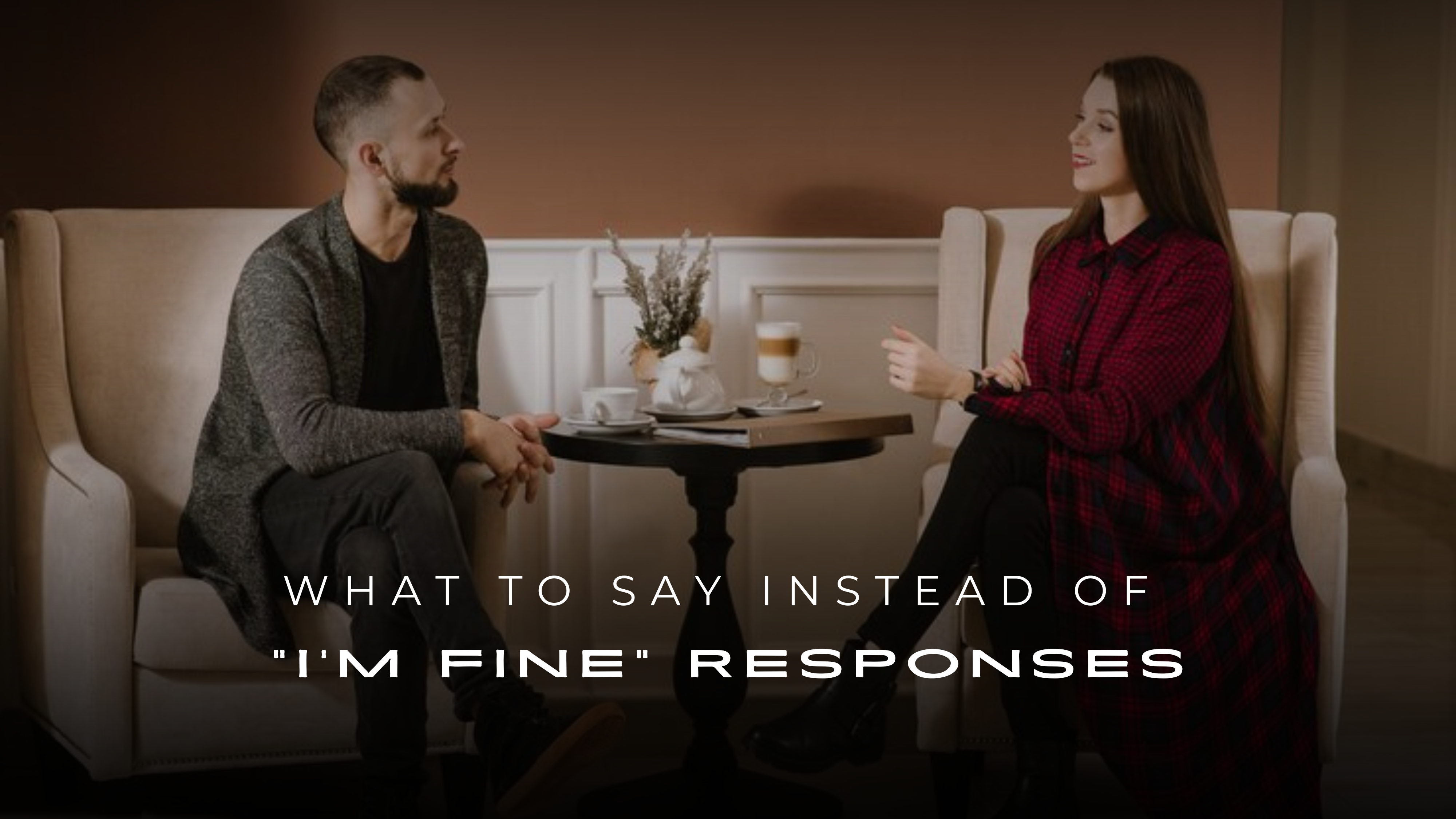We’ve all been there. You ask someone how they are, and they reply with the ever-so-common, “I’m fine.” This phrase has become almost automatic in social interactions. But what does it mean? And how should we respond to it? Understanding the nuances of this simple phrase can significantly enhance our communication skills and help us build stronger connections with others.
Why People Say “I’m Fine”
- Social Norms and Politeness
“I’m fine” is often a polite way to acknowledge someone’s inquiry without interrupting a lengthy conversation. It’s a social norm that keeps interactions smooth and courteous.
- Avoiding Vulnerability
Many people use “I’m fine” as a shield to avoid opening up about their true feelings. It can be a defense mechanism to protect themselves from vulnerability.
- Masking True Feelings
Sometimes, people say, “I’m fine,” because they are not ready to confront or share their true emotions. It’s a way to mask what they’re experiencing, whether it’s sadness, stress, or anxiety.

200+ Genuine Responses to “I’m Fine“
Casual/Polite Acknowledgment
- Glad to hear you’re doing well.
- That’s good to know!
- Nice, sounds good!
- Great, thanks for letting me know.
- It’s good to hear that.
- Okay, thanks for sharing.
- Awesome, I’m glad you’re alright.
- Perfect, I’m happy to hear that.
- Cool, thanks for the update.
- Alright, that’s great.
Genuine Concern/Follow-up
- Are you sure? You seem a bit off.
- Is everything okay?
- Do you want to talk about it?
- There might be more to the story. Are you okay?
- It’s okay if you’re not fine. You can tell me.
- I’m here if you need to talk more.
- Sometimes, saying ‘I’m fine’ means you’re not. Want to chat?
- Your tone makes me think otherwise. What’s going on?
- You can be honest with me, you know.
- I’m sensing something’s up. Do you want to talk about it?
Friendly/Supportive
- If you need to talk, I’m here for you.
- I’m always here if you need someone to listen.
- It’s okay if you’re not fine. I’m here.
- Feel free to share if you need to.
- I’m here for you no matter what.
- Remember, it’s okay not to be okay. I’m here.
- You don’t have to go through anything alone.
- If you ever need a friend, I’m right here.
- Take your time. When you’re ready to talk, I’m here.
- You’re not alone in this. I’m here to support you.
Humorous/Light-hearted
- Just fine? Need to be more spectacular?
- Only fine? What happened to amazing?
- Fine like wine or fine like a parking ticket?
- Fine, or like, just surviving?
- Fine, as in, did you wake up fine or conquer the world fine?
- Fine, or did you mean fabulous?
- Fine? Did you spill coffee on yourself this morning?
- Fine? That’s not very convincing!
- Fine? So, no winning the lottery today?
- Fine? Do I need to send over some emergency ice cream?
Reflective/Empathetic
- I know how that feels. If you want to chat, I’m here.
- Sometimes, fine is the best we can do, and that’s okay.
- I’ve been there too. If you need to vent, I’m all ears.
- It’s okay to feel fine. Every emotion has its place.
- I get it. Fine can mean a lot of things.
- I understand. Some days are just fine.
- I hear you. The fine is a safe place to be sometimes.
- It’s okay to feel fine. I’m here if you need anything.
- We all have ‘fine’ days. If you need support, let me know.
- Feeling fine is perfectly valid. If you want to talk more, I’m here.
Redirecting
- Glad to hear! What have you been up to lately?
- The fine is good! Any plans for the weekend?
- That’s nice. How’s work/school going?
- Good to know. So, what’s new with you?
- Fine works. Have you seen any good movies lately?
- Cool, is anything exciting happening soon?
- Alright, is there anything fun planned for today?
- Good to hear. Have you been working on any new projects?
- Okay, what have you been doing for fun recently?
- The fine is good. Have you been reading any good books?
Sharing/Relating
- I’ve been feeling the same way. What’s been going on with you?
- I had one of those days recently, too.
- Same here! It’s been a tough week.
- I know what you mean. Sometimes, ‘fine’ is all you can say.
- I’ve had days like that, too. Is anything specific on your mind?
- I get it. Some days are just ‘fine’ days.
- I’ve been there. Want to chat about it?
- I understand. It’s been a similar kind of day for me.
- I feel you. Sometimes, ‘fine’ is the best answer.
- I’ve had those days, too. Anything you’d like to talk about?
Encouraging/Positive
- That’s good to hear! Keep it up!
- The fine is a good start! I hope things keep getting better.
- Awesome! Stay positive!
- Good to hear. Remember, you’re doing great!
- I’m glad to hear you’re doing okay. Keep pushing forward!
- Fine is better than bad. Keep going!
- That’s good. I wish you an even better day ahead!
- Fine is a solid place to be. Stay strong!
- Glad you’re fine. I am sending positive vibes your way!
- Good to know. Keep smiling and moving forward!
Curious/Engaging
- Fine, as in great or just okay?
- What makes today just fine?
- Fine, there’s more to the story.
- Fine, but is there something more you’d like to share?
- Fine? How come just fine?
- What’s been going on that’s making you feel fine?
- Fine can mean a lot of things. Want to elaborate?
- Fine? Is anything interesting happening?
- What’s on your mind? Is anything making you feel fine?
- Fine, huh? What’s been the highlight of your day?
Affirming
- That’s good. Sometimes, fine is just enough.
- It’s okay to be fine. Not every day has to be amazing.
- Fine is a valid feeling. I’m glad you’re okay.
- The fine is perfectly acceptable. Take it easy.
- I’m glad you’re doing fine. That’s what matters.
- The fine is good enough. We all have those days.
- It’s okay to be just fine. No pressure.
- The fine is still good. Happy to hear that.
- It’s okay to feel fine. No worries.
- The fine is okay. Glad you’re managing.
Playful/Teasing
- Fine, or pretending to be fine?
- Just fine? Need to be fine-tastic?
- Fine, did you wake up or conquer the world?
- Fine? Do I need to bring out the emergency chocolate?
- Fine? Did your cat type that?
- Fine? Are we talking about fine wine or fine wine like a speeding ticket?
- Just fine? Not even awesome?
- Fine? Did someone steal your sparkle today?
- Fine? Should I be worried?
- Fine? Is that code for something?
Concerned but Respectful of Privacy
- Okay. If you ever feel like talking, let me know.
- Understood. Just know I’m here for you.
- I got it. If you need anything, I’m around.
- Alright. I’m here if you ever want to share more.
- I respect that. If you need a chat, I’m here.
- Okay, I’m here if you change your mind about talking.
- No problem. Reach out if you need anything.
- I hear you. My door is always open if you need to talk.
- Alright, I’m here whenever you’re ready to talk.
- I get it. Just know I’m always here for you.
Offering Help
- If you need any help, don’t hesitate to ask.
- Anything I can do to make things better?
- Let me know if there’s something I can do for you.
- Is there anything you need right now?
- I’m here to support you in any way I can.
- Do you want to talk about what’s on your mind?
- If anything is bothering you, I’m here to listen.
- Need a distraction or someone to talk to?
- I’m just a call/text away if you need assistance.
- Feel free to lean on me if you need help.
Encouraging Self-care
- Remember to take care of yourself.
- Make sure to take some time for yourself.
- Remember to do something nice for yourself today.
- Self-care is important. How about treating yourself?
- Take a breather and do something you enjoy.
- Self-care tip: Take a walk or indulge in a hobby.
- Prioritize your well-being. You deserve it.
- It’s okay to take a break and recharge.
- Self-care isn’t selfish. It’s necessary.
- Take some time to relax and unwind.
Reflective Listening
- It sounds like things are okay, but it could be better.
- I hear you. Fine can mean a lot of things.
- You’re holding something back.
- There may be more going on.
- You sound like there’s something on your mind.
- Your ‘fine’ sounds like there’s a story behind it.
- I get the feeling there’s more you’re not saying.
- A fine can be a cover. Is there something you want to share?
- It sounds like you’re managing, but is there more?
- I’m here to listen if you decide to open up.
Inspirational
- Every day is a new opportunity to feel better.
- Keep pushing forward. Better days are coming.
- You’re doing great, even if it doesn’t feel like it.
- Stay strong. You’ve overcome challenges before.
- Your resilience is inspiring. Keep going.
- You’ve got this—one step at a time.
- Even on ‘fine’ days, you’re making progress.
- Believe in yourself. You’re capable of amazing things.
- Remember, tough times don’t last forever.
- You’re stronger than you think. Keep moving forward.
Appreciative
- I appreciate you sharing how you feel.
- Thanks for letting me know.
- I’m grateful that you’re open with me.
- Your honesty means a lot to me.
- I value our ability to talk openly.
- Thank you for trusting me with your feelings.
- I’m thankful to have you in my life.
- I appreciate your honesty, no matter what.
- Thanks for being upfront with me.
- I’m glad you feel comfortable sharing with me.
Validating Feelings
- It’s perfectly okay to feel fine.
- Your feelings are valid, whatever they are.
- It’s okay to have ups and downs.
- Feeling ‘fine’ is completely normal.
- Your emotions are valid, no matter what.
- You don’t have to justify how you feel.
- It’s okay to feel whatever you’re feeling.
- Your feelings matter, regardless of how you label them.
- I hear you. It’s okay to feel ‘fine.’
- You’re allowed to feel however you feel.
Light and Indifferent
- Alright, good enough!
- Okay, gotcha.
- Fine works for me.
- No worries, take it easy.
- Sounds good to me.
- Fine, no problem.
- Cool, whatever floats your boat.
- You got it, no biggie.
- Sure, if that works for you.
- Fine, I’m flexible.
Checking In Later
- Let’s catch up later to see how you’re doing.
- I’ll check back in with you soon.
- We can talk more about it another time if you want.
- I’ll check in with you later.
- Let’s revisit this later when you feel up to it.
- I’ll check back in with you later to see how things are.
- Take care, and we’ll talk more later.
- I’ll follow up with you later on this.
- We can discuss this further when you’re ready.
- I’ll check in again to see how you’re feeling.
When to Probe Further
- Recognizing Signs of Distress
Pay attention to body language and tone of voice. If someone seems off, it might be worth probing a bit more.
- Respecting Boundaries
While showing you care is important, respecting the person’s boundaries is equally important if they are not ready to share.
Alternative Replies to “I’m Fine”
- Encouraging Authenticity
Encourage people to be more authentic by sharing your feelings first. This can help them feel more comfortable being honest.
- Offering Support
Sometimes, offering specific support can be more effective than a generic reply. Phrases like “Do you need any help with anything?” can be very supportive.
Cultural Differences in Responses
- Western vs. Eastern Approaches
In some cultures, sharing personal feelings openly is more common, while maintaining a façade of composure is the norm in others. Understanding these differences can help tailor your responses appropriately.
- The Role of Context
Context matters. The same phrase might have different connotations in different settings, such as a casual chat with a friend versus a formal interaction at work.
Psychological Insights into “I’m Fine”
- Emotional Intelligence
Developing emotional intelligence can help you better understand and respond to the phrase “I’m fine.” This involves being aware of both your own and others’ emotions.
- Impact on Mental Health
Consistently masking true feelings can have negative effects on mental health. Encouraging open and honest communication can promote emotional well-being.
Improving Communication Skills
- Active Listening
Active listening involves fully concentrating, understanding, and responding thoughtfully to what someone is saying. It’s a crucial skill for improving communication.
- Open-Ended Questions
To encourage more detailed responses, ask open-ended questions like “How has your day been?” or “What’s been on your mind lately?”
Building Stronger Connections
- Deepening Relationships
Moving beyond superficial conversations can build deeper and more meaningful relationships.
- Trust and Honesty
Encouraging honesty and showing trustworthiness can create a strong foundation for any relationship.
Responses to “I’m Fine” in Professional Settings
- Workplace Dynamics
Maintaining a balance between showing concern and respecting professionalism in professional settings is important. Simple responses like “Let me know if you need anything” can be effective.
- Maintaining Professionalism
While showing empathy, maintaining professionalism is crucial to ensure the work environment remains respectful and productive.
Teaching Children to Respond to “I’m Fine”
- Encouraging Emotional Expression
Teach children to express their emotions openly. Ask them questions about their feelings and listen without judgment.
- Building Emotional Awareness
Help children build emotional awareness by discussing different emotions and how to handle them.
Technology and “I’m Fine”
- Digital Conversations
Interpreting “I’m fine” can be even more challenging in digital communications. Use clear and supportive language to convey your concern.
- Emojis and Text Responses
Emojis can add nuance to digital conversations. A simple heart or smiley face can show you care.
Conclusion
Exploring genuine alternatives can deepen connections and foster authentic conversations in a world where ‘I’m fine’ often serves as a default response. From expressing nuanced emotions to sharing personal anecdotes, the options are endless. By being more open and sincere in our replies, we invite others to do the same, creating meaningful, resonating exchanges.
For further inspiration on crafting perfect responses, check out our guide on:
how to Impress Your Crush with 200+ Perfect Replies to ‘Thank You’.”
FAQs
Q. What should I say instead of “I’m Fine”?
Consider sharing more about your day or how you’re feeling. For example, “I’ve had a bit of a tough day, but I’m managing.”
Q. How can I tell if someone is truly fine?
Please pay attention to their body language, tone of voice, and any inconsistencies in their behavior. If something seems off, gently probe with supportive questions.
Q. Is it okay to always respond with “I’m Fine”?
It’s okay occasionally, but try to be more open with trusted friends and family. Sharing your true feelings can strengthen your relationships.
Q. What are some signs that someone is not fine?
Signs might include avoiding eye contact, changes in behavior, reluctance to engage in conversation, or a tone that doesn’t match their words.
Q. How can I improve my response to “I’m Fine”?
Show genuine interest, ask open-ended questions, and offer support. Sometimes, just being there and listening can make a big difference.











1 thought on “What to Say Instead of “I’m Fine” – 200+ Genuine Responses”